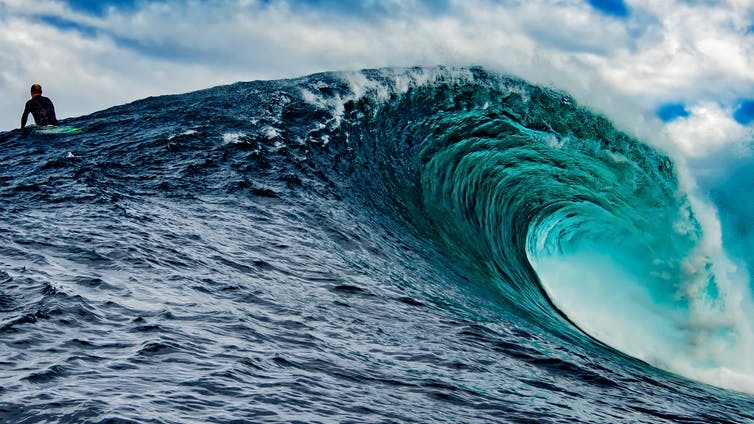Surfing is as cool as it ever was. More people are competing in more contests and seeking higher waves, supported by a booming industry, even amid a pandemic.
Dramas and documentaries about surfing have bloomed since the 1960s, and companies such as Quicksilver, Billabong and Roxy have developed entire markets around the surf lifestyle. The recent decision to include surfing in the Tokyo Olympic Games marked the zenith of the global popularity of this sport.
Even though surfing is an extreme sport, most of it consists of the gentle art of waiting. Ask any passionate surfer, and they will probably tell you that surfing is, first and foremost, a contemplative practice.
“Surfing is a kind of stoic philosophy – it means accepting that we don’t have power over things,” writes novelist Sigolène Vinson.
To understand why, we must go back in history. Surfing was originally a spiritual activity rooted in the religion and culture of different islands in the Pacific Ocean, especially Hawaii. It represented the celebration of Lonos, the god of fertility. At the time, only the tribe’s high-ranking figures could undertake it.

Today, some surfers still follow this original mindset of communion with nature. “We call them soul surfers,” writes Lodewijk Allaert in his ode to surfing:
They explore the imperceptible side of the discipline, dreaming of the precious balance between man and the elements, which pushed the Hawaiian pioneer of surfing, Duke Kahanamoku, to throw himself into colossal walls of water equipped with an antique acacia board. For them, surfing wasn’t a way to show off or a series of spectacular moves, but a lifestyle, a philosophy.
These few utopian surfers base their entire lives around surfing, going against the flow of our society where capitalism is relentlessly expanding toward new areas, the alienation caused by technology always intensifying and freedom increasingly compromised.
Soul surfers vs capitalist sharks
The feeling of being fully present in what we are actually doing has become rare – except perhaps in the case of those who practice extreme sports (it’s difficult to think about work when you have to focus on not being crushed by a two-metre wave).
Surfing is an escape; an act of freedom. This is why it can be linked to the ideal of the American counterculture of the 1960s based on the “freewheeling spirit of the hippies” and modern forms of Bohemianism, largely inspired by the Beat Generation.
Like many other countercultures, from skateboarding and yoga to meditation and hip-hop, surf has to an extent been absorbed by capitalism. Look at the proliferation of surf schools, magazines, competitions, films, music, and surf wear, each representing an attempt by businesses to make money out of the sport. Like a prey splashing in the water, surfing has attracted the attention of capitalist sharks, and became a victim of its own success.
Yet, with surfing, unlike some of these other countercultures, something still resists. Capitalism cannot seem to capture the unique and solitary moment when the surfer must put aside everything he or she knows to avoid getting swept away, to ride the wave and feel a sense of communion with the powerful and untameable elements.

Surfing is the ultimate in unpredictability. Even the best weather apps cannot predict whether or not it will be possible to surf a particular swell.
The ocean puts human beings in their rightful place – not above nature but inside of it. I dare even René Descartes to try to become a “master and possessor of nature” in the building-sized waves of Nazaré in Portugal, the largest in the world.
The ocean as the last frontier
In a world where transhumanists seek to use technology to save humanity, and even to even to defeat death, surfing reminds humans of our staggering insignificance before the irresistible force of the ocean – and nature in general.
In the context of an increasingly tech-based and dehumanized approach to medicine, surfing can appear as a particularly efficient cure for the soul. While some hospitals have introduced secular meditation programmes to alleviate the pain of patients suffering from chronic illnesses or depression, others have used surfing for therapeutic purposes to help cure people like veterans suffering from post-traumatic stress disorder.
Now, a pandemic has caused many to question their lifestyles – moving, changing jobs or getting divorced. New rules implemented by the government to limit the spread of the virus have also had a major impact on individual freedoms. Not only directly when being mandated to wear masks, respecting curfews, and in some regions, forbidding access to the beach, but also in a more diffuse manner with the proliferation of applications intended to control citizens’ movements. Some have even gone so far as to place such measures within the realm of surveillance capitalism.
While American counterculture originally conceived technology as a way to free individuals from the establishment, they are increasingly criticized today. Surfing may be able to make this dream of pure freedom come true even for a short time by providing its practitioners with moments off the radar.
“Surfers are often portrayed as conquerors who travel on a whim, with new waves to discover, fleeing the trials and tribulations of modern life,” writes sociologist Jérémy Lemarié. “Today, the ocean is their only escape in the overpopulation and compartmentalisation of modern life. The ocean is their last frontier.”
In a 1945 presentation to the US government, Vannevar Bush presented science as the new frontier to be conquered. It would now seem that his wish has been fulfilled. Today, technology promises to take over both time, for those who dream of killing death, and space, with the billionaire race to conquer new planets. And yet, grab a board and head to the sea and you will soon realise that nature is still far from conquered. In this context, the ocean can be seen as the last frontier likely to comfort mankind when facing disenchantment with modern life.
This article is republished from The Conversation under a Creative Commons license. Read the original article.
License and Republishing
The Choice - Republishing rules
We publish under a Creative Commons license with the following characteristics Attribution/Sharealike.
- You may not make any changes to the articles published on our site, except for dates, locations (according to the news, if necessary), and your editorial policy. The content must be reproduced and represented by the licensee as published by The Choice, without any cuts, additions, insertions, reductions, alterations or any other modifications.If changes are planned in the text, they must be made in agreement with the author before publication.
- Please make sure to cite the authors of the articles, ideally at the beginning of your republication.
- It is mandatory to cite The Choice and include a link to its homepage or the URL of thearticle. Insertion of The Choice’s logo is highly recommended.
- The sale of our articles in a separate way, in their entirety or in extracts, is not allowed , but you can publish them on pages including advertisements.
- Please request permission before republishing any of the images or pictures contained in our articles. Some of them are not available for republishing without authorization and payment. Please check the terms available in the image caption. However, it is possible to remove images or pictures used by The Choice or replace them with your own.
- Systematic and/or complete republication of the articles and content available on The Choice is prohibited.
- Republishing The Choice articles on a site whose access is entirely available by payment or by subscription is prohibited.
- For websites where access to digital content is restricted by a paywall, republication of The Choice articles, in their entirety, must be on the open access portion of those sites.
- The Choice reserves the right to enter into separate written agreements for the republication of its articles, under the non-exclusive Creative Commons licenses and with the permission of the authors. Please contact The Choice if you are interested at contact@the-choice.org.
Individual cases
Extracts: It is recommended that after republishing the first few lines or a paragraph of an article, you indicate "The entire article is available on ESCP’s media, The Choice" with a link to the article.
Citations: Citations of articles written by authors from The Choice should include a link to the URL of the authors’ article.
Translations: Translations may be considered modifications under The Choice's Creative Commons license, therefore these are not permitted without the approval of the article's author.
Modifications: Modifications are not permitted under the Creative Commons license of The Choice. However, authors may be contacted for authorization, prior to any publication, where a modification is planned. Without express consent, The Choice is not bound by any changes made to its content when republished.
Authorized connections / copyright assignment forms: Their use is not necessary as long as the republishing rules of this article are respected.
Print: The Choice articles can be republished according to the rules mentioned above, without the need to include the view counter and links in a printed version.
If you choose this option, please send an image of the republished article to The Choice team so that the author can review it.
Podcasts and videos: Videos and podcasts whose copyrights belong to The Choice are also under a Creative Commons license. Therefore, the same republishing rules apply to them.





